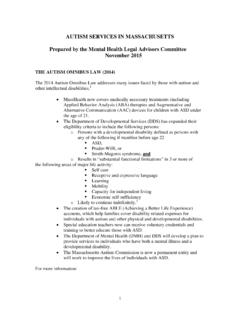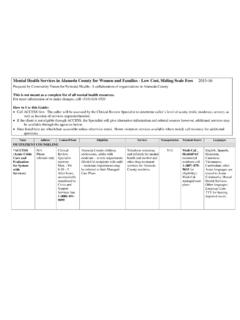Transcription of Adult Mental Health Strategic Plan
1 Adult Mental Health Strategic plan City of Jacksonville, Florida Photograph by Tom Garwood A STRATEGY FOR THE FUTURE. Adult Mental Health Strategic plan City of Jacksonville, Florida Ms. Sherry Burns, Chair, Adult Mental Health Task Force Report produced by: Adult Mental Health Task Force Technical assistance provided by: City of Jacksonville Community Services Department Additional technical assistance provided by: Human Services Research Institute Cambridge, MA. January 2006. ii January 6, 2006. Honorable John Peyton, Mayor City of Jacksonville, FL. City Hall at St. James Jacksonville, FL 32202. Dear Mayor Peyton, On behalf of the Adult Mental Health Task Force, it is my pleasure to submit to you the Adult Mental Health Strategic plan : A Strategy for the Future. This report provides a comprehensive assessment of the Adult Mental Health system in Jacksonville, and it offers a number of recommendations to improve the system.
2 We found that Jacksonville's Mental Health system reflects many of the same problems found throughout the nation; it is fragmented, unresponsive to the needs of individuals and families, not recovery oriented, and it is significantly under-funded. Many of our recommendations however, are designed to affect process changes, with minimal initial costs. Longer-term capacity changes could be accomplished incrementally, after the system has maximized existing resources. Our guiding vision throughout this project was to foster a community in which everyone in Jacksonville who requires Mental Health services will have access to effective treatment, leading to recovery. We believe that this report provides a useful guide to plan for the challenges of the future. The Strategic plan is the product of the hard work of a cross section of Mental Health professionals, advocates, and concerned citizens. The Task Force members have affixed their signatures to the report to underscore their commitment to its goals for improving the Mental Health system in Jacksonville.
3 We would like to express our appreciation for the technical assistance provided to the Task Force by the City of Jacksonville, and to Dr. Delphia S. Williams, Director of Community Services, and her staff. Sincerely, Sherry Burns, Chair, Adult Mental Health Task Force iii Adult Mental Health Strategic plan A Strategy for the Future Table of Contents I. Executive Summary vi II. Introduction A. Rationale, Purpose, and Scope of plan 1. B. Organization of the plan 4. III. Mission, Vision, Guiding Principles, Goal Statement 5. IV. Background 6. V. Gap Analysis 11. A. Prevalence of Mental Illness in Jacksonville 12. B. Costs Associated With Mental Illness 15. C. Funding Considerations 20. D. Community Profile 22. E. Environmental Analysis 23. F. Funding sources and Issues 28. G. Continuum of Care 29. H. Methodology 31. I. Findings/Gap Summaries 33. VI. Data Sources and Limitations 52. VII. Recommendations and Implementation plan A.
4 Generic Recommendations 54. B. Prevention 55. C. Treatment 56. D. Housing 57. E. Rehabilitation 58. F. Public Information 59. G. Implementation 60. iv VIII. Appendices A. Task Force Members/Endorsement 64. B. Prevention Survey 75. C. Prevention Notes 77. D. Prevention SWOT 87. E. Treatment Notes 88. F. Treatment SWOT 105. G. Treatment SPES 107. H. Service Definitions 111. I. Housing SPES 122. J. Housing Notes 124. K. Housing SWOT 130. L. Rehab SPES 132. M. Rehab Notes 134. N. Rehab SWOT 148. O. Questionnaires 150. IX. Works Cited 158. v I. Executive Summary Introduction The Adult Mental Health Strategic plan grew out of concerns over a crisis in the availability of Adult Living Facilities (ALFs) for persons with Mental illnesses in Jacksonville, as well as concerns over a variety of reports that pointed to widespread problems with the Mental Health system throughout the country. The Adult Mental Health Strategic plan is the product of the Adult Mental Health Task Force.
5 The Task Force's mission was to maximize Mental Health services in Jacksonville. The first step in fulfilling its mission was to produce an Adult Mental Health Strategic plan , designed to maximize resources, improve services, and address gaps and other problems with the current system. With the support of Mayor John Peyton, the City of Jacksonville's Community Service Department took the initiative and convened an Adult Mental Health Task Force. The primary goal of the Task Force was to produce an Adult Mental Health Strategic plan . The Task Force organized itself as an independent body, and the City's Community Service Department, through its Mental Health and Welfare Division, provided ongoing technical support. Additional technical support for the project was provided by the Human Services Resource Institute of Cambridge, Massachusetts (HSRI). HSRI. is funded by the Substance Abuse and Mental Health Services Administration (SAMHSA).
6 Technical assistance from HSRI included an onsite Mental Health assessment workshop, ongoing technical support, a review of the Strategic plan process and related documents, and a specialized computer-assisted assessment of data generated from the Task Force Workgroups. The Adult Mental Health Strategic plan follows a standard Strategic plan format, and begins with a background summary of major Mental Health publications and documents. The review provides the basic rationale that justifies the need for a local Mental Health Strategic plan . The President's New Freedom Commission on Mental Health , and the Surgeon General's Report on Mental Health for example, both indicate that the nation's Mental Health system is fragmented, disorganized, ineffective, and in disarray. Moreover, the reports provide numerous statistics that detail the prevalence of Mental illnesses, and the personal and financial costs associated with Mental illnesses.
7 Vi The unmistakable conclusion is that the entire system must be reorganized and made less fragmented, more client-centered, and recovery driven. One in five Americans experience a Mental disorder in a one year period, and Mental illnesses account for more than 15% of the overall Health burden from all causes even more than all cancers. Highlights The following are highlights from the remaining sections of the Executive Summary: Major reports indicate that the country's Mental Health system is dysfunctional, inefficient, and not client-driven or recovery-oriented. The City of Jacksonville facilitated an independent Adult Mental Health Task Force to assess the local Adult Mental Health system and to recommend improvements. Analysis indicates local system is fragmented, unresponsive to client needs and serves less than 20% of those with even the most severe Mental illnesses. Jacksonville has an estimated 62,000. persons with severe Mental illnesses, and over 171,000 with a diagnosable Mental illness, yet public funding supports services to only about 11,000 adults with severe Mental illnesses.
8 Mental illness results in staggering costs, amounting to over 15% of the global cost of all diseases. Jacksonville's publicly funded Adult Mental heath system accounts for over $56 million in direct costs alone. The $56 million is only about 20% of the cost of an adequate service system, which could run over $282 million if fully implemented. The local system is primarily limited to services for the most severe Mental illnesses. Initial improvements would require minimal costs and focus on system-level and organizational changes. Long-range programmatic changes that lead to specific improvements in client-outcomes can be accomplished and budgeted for incrementally, and should be linked to research-based practices. Jacksonville's Adult Mental Health system has no systematic, reliable management information system, has insufficient housing options for persons suffering with Mental illnesses, and has no widespread use of research-based Mental Health strategies for Mental Health promotion, prevention of Mental illnesses, or Mental Health treatment.
9 Vii Public access to services is significantly affected by funding limitations, complicated and fragmented program requirements, and the stigma associated with Mental illness. Initial efforts to improve Jacksonville's Adult Mental Health system should focus on broad, system-wide improvements and long-range planning for Mental Health system transformation that are consistent with efforts currently underway at the federal and State levels. Recent research suggests that local governing bodies, such as Mental Health Authorities, are the most effective tool to help communities transform their Mental Health systems. Recommendations for improving the system are reflected in the following goals of the Adult Mental Health Task Force: 1. Institute wide-spread use of evidence-based practices, with performance objectives and an oversight process that ties evidence-based performance to funding. 2. Establish a non-profit, local Mental Health Coalition of Mental Health agency professionals, advocates, and concerned citizens, to function as a focal point for Adult Mental Health issues, to coordinate major grant applications, and to facilitate collaborative working relationships among the various Mental Health system stake-holders.
10 3. Establish permanent subcommittees of the Mental Health Coalition for Prevention, Treatment, Housing, Rehabilitation, and Public Input. 4. Advocate for an overall increase in Mental Health funding that will enable 20% of the new Mental Health funding to be directed towards Mental Health promotion and Mental illness prevention activities. 5. Solicit SAMHSA and State technical assistance in the development of a comprehensive management information system, future outcome measures, and evidence-based practices, to be consistent with emerging federal Mental Health transformation process. viii 6. Task Mental Health Coalition to develop a comprehensive Mental Health promotion/ Mental illness prevention plan . 7. Establish a local Mental Health Authority, empowered to affect the distribution of Mental Health funding, recommend statutory changes, hold public hearings, act as legislative liaison for Mental Health issues, and to provide standards and practices oversight.






